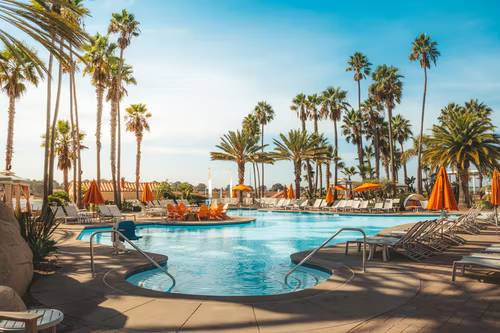
Introduction.
It is essential to keep your home energy-efficient. But there are a few complicated parts of the house that give a hard time in saving energy. Swimming pools can serve as one of the most prominent house features; that complicate the energy-saving process.
Swimming pools are not just spaces filled with water but are giant complex machines, using a lot of energy to keep running and staying sanitary. You would be surprised if you get to know the amount of energy taken by your swimming pool, no matter big or small. Unfortunately, most of the energy that is used by the pools goes to waste. This becomes a source of detriment to the environment, the pool owner, and the swimming pool itself.
Since sustainability has influenced almost everything globally, from architecture to travel, the pool industries are constantly developing new products geared around maximizing a minimum use of energy.
What is an Energy-Efficient Pool?
When the summer arrives, most of us want to plan a gathering at the poolside and have a nice dip in the cold water. Pools are an excellent source of family and friends bonding and fun material throughout the year. Many pool owners often complain about spending a hefty amount of money building and powering their swimming pools. Still, its maintenance costs often outweigh all the pros, leaving them with only cons. Therefore, as the name suggests, a swimming pool that saves energy is energy-efficient. There are a lot of ways to maintain and manage energy-efficient pools effectively. It would save time and money that is needed in so many other essential aspects of life.
How can you make your pool more energy-efficient?
Have a look below to know how you can make your pools run on minimum energy and provide maximum enjoyment.
Use Solar Energy.
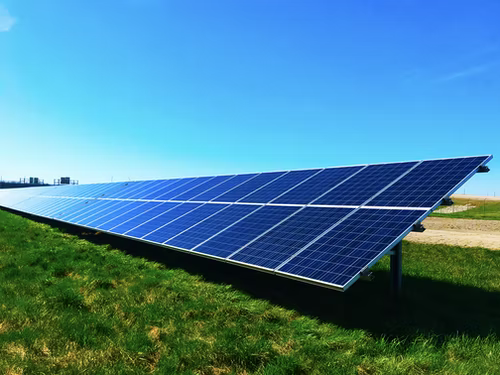
Make great use of the sun by employing solar covers/blankets and solar heaters in your swimming pools. These solar heaters would absorb thermal energy from the sun and keep the pool water warm. The solar panels trap the solar energy to warm the pool water during the day, while the solar blankets, with the help of their bubble-wrap-like air pockets, maintain the pool's temperature at night by trapping the sun rays inside them.
Additionally, installing solar heaters and covers in your pools helps you save around 60% to 70% of the heating costs. The only issue with these solar heaters is when the climate makes the collection almost impossible to heat. Otherwise, you are good to go.
Decrease Water Evaporation.
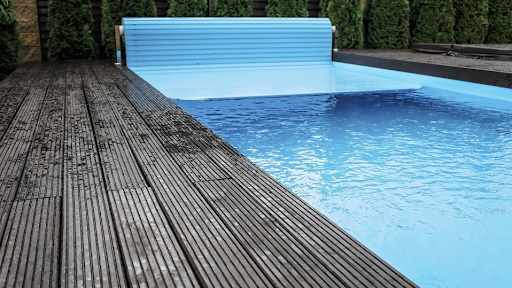
According to research, the most significant part of energy in swimming pools is consumed by water evaporation. The surface evaporation of water causes around 80% to 90% of the temperature loss of the water pool, whether it is an indoor or an outdoor water body. Mathematically, a single gallon of evaporated water takes approximately 8500 BTUs (British Thermal Units) of energy and around 1.5 inches of water every week.
Water evaporation in pools can be caused by several factors. For example, a larger surface area, water temperature, humidity, wind, and pool usage. Since these factors are almost impossible to eradicate, buying a pool cover seems the best option.
Covering your pools when not in use can prevent water evaporation to about 96%, thus making your pool more energy-efficient.
Give Your Pool Lights an Update.
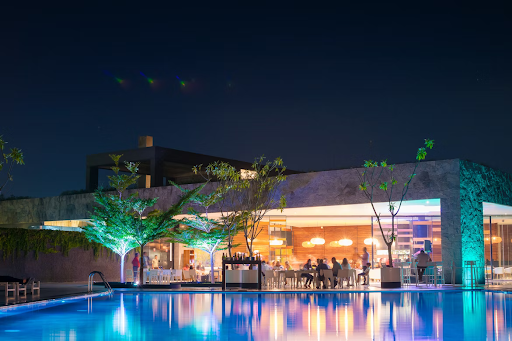
Well-lit swimming pools give you countless nights to enjoy a late-night swim peacefully under the stars. However, you are aware that pool lights are not a cheap investment to make. Therefore, the type of pool lights you install in your water bodies will make a vast difference in their energy consumption.
There are three most-used types of pool lights available.
Incandescent lights: These bulbs are one of the least energy-efficient bulbs because they get boiling just within no time.
Halogen lights: Like incandescent bulbs, these lights also emit heat energy and are less energy-efficient.
LED lights: The best pool lights ever existed, LED lights have become the most popular yet the most effective water lights. They save around 80% of energy, beating the two types of lights mentioned above. They also last four times longer than other bulbs, up to 300,000 hours, thus saving replacement costs and less disposal.
Look into the Filtration System.
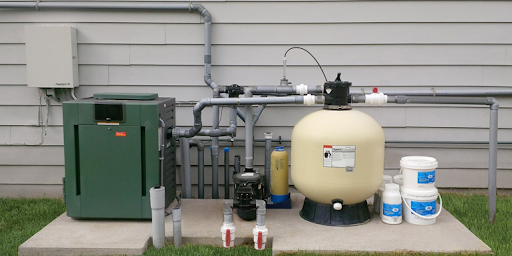
The more the debris, the faster the pool drains. The pool's filtration system works harder to filter the water inside, thus, consuming more energy. Maintaining regular cleanliness saves up more energy, ensuring that the filtration system runs efficiently.
Sand pool filters are the commonly used pool filters. They are simple and easy to install, but the biggest drawback with these filters is that they consist of sand, as the name suggests. The more debris mixes with the sand while cleaning, the thicker it becomes. This creates a water-flow resistance, thus making sand pool filters the slowest of all filter systems.
Cartridge pool filters are the poster child of all pool filters available in the market. Let us tell you why. As their name, these filters only use cartridges to filter out the debris from swimming pools. These filters are not very sensitive like sand filters, thus causing a lesser water flow resistance, resulting in lower energy use.
Use Energy-saving Pool Pumps.
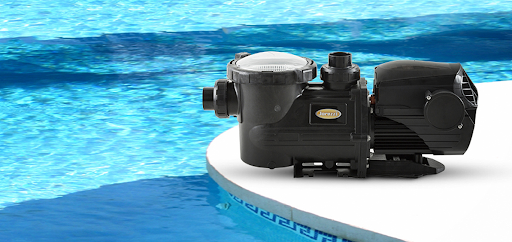
The amount of energy consumed by a swimming pool depends on the pool pump. These pumps use almost a quarter of the pool's power, which is still high on average. Because of this reason, pool owners have started showing interest in buying energy-efficient pool pumps. These state-of-the-art pumps utilize less energy than the older versions and make the homes more environmentally responsible.
There are two kinds of pool pumps.
Single-speed pool pump: The majority of pool owners across the globe use this kind of pool pump. That is because of their low cost. But this cost is only down when you buy these from the market. The amount of money it needs to be spent on its maintenance is a whole separate story. Why? A single-speed pump is not adjustable or compatible with small-sized pools. Additionally, single-speed pool pumps work at around 1.5 horsepower, while a swimming pool does not require more than 0.75 horsepower to operate. Thus, a total waste of energy.
Dual-speed & Variable-speed pumps: As their name says it all, a dual-speed pool pump will offer two-speed settings for the pump to operate. These pumps are money-saving, but it is a complicated machine for setting their flow rates. Variable-speed pumps are the best option to install in your swimming pool since it is simple, easy to use, and pretty convenient to adjust the speed settings that cater to your requirements.
Buy Automatic Pool Cleaners
Everyone requires a helping hand when it comes to cleaning their water bodies. For this reason, an automated pool cleaner is a wise choice to look for because they operate automatically to fulfill everyday tasks like vacuuming or brushing the swimming pool.
The pool cleaners working on pressure are an excellent choice for cleaning pools. Also known as Pressure side pool cleaners, this simple machine is operated by a reliable booster pump and runs automatically after the adjusted intervals of time. Like other cleaners that require direct electricity to work, these pressure-side pool cleaners can be a great selection to lower power consumption, thus making your swimming pool more energy efficient.
Benefits Of Energy-Efficient Pools.
We have listed a few advantages you can get by making your swimming pools energy-efficient.
Reduced Amount of Energy.
Optimizing your water pool and making it more energy-efficient means decreasing the power required to heat the pool. Eventually, this would reduce the heat and release you from the burden of high electricity bills because of heating your pools.
Low Electricity Costs.
As already discussed above, an energy-efficient pool would not break your banks while paying for the electricity bills when heating. This is because, with an energy-saving pool, you will not have to run the heating machine into it constantly. For example, installing a solar heating system for pool heating means foregone all electricity expenditure that you used to do previously. The solar heating systems will only use electricity if there is no sun in extreme cold weather conditions.
Environment-friendly.
Consistent heating of the pools via conventional methods releases harmful gasses into the atmosphere and messes up the natural environment by consuming non-renewable resources. With the use of an energy-efficient pool, this is not the case. It uses all the alternative sources to heat the water and preserve the temperature so that heating your pool does not cause any harm to the environment around.
Sustainable Swimming.
How does swimming maintain sustainability? Simple. Now, installing power-saving equipment to your pools would make them energy-efficient and environment-friendly for a longer run. This ensures that your future generations would also enjoy the same optimized- energy swimming just like you would want in the present.
Encouraging State-of-the-art Technology.
When more and more people would look forward to using the energy-efficient equipment in their daily living, it would encourage the invention of new technology, thus, promising a better future. Other energy-saving products would emerge in the market by eliminating older appliances that are cheap to buy but costly to operate and maintain. New technology energy-efficient pool equipment is undoubtedly a one-time for a lifetime investment.
Quick Tips.
- Using a solar pool cover helps lock the pool's temperature and enhances heating efficiency.
- Using an automated timer is beneficial for automatically running the pool's heating and pumping equipment.
- Keeping the filter clean is the key to minimum water-flow resistance.
- Running the pool pumps at night helps lower the energy use even further.
